How can you serve?
St. John the Baptist Parish encourages our parishioners who feel that they are called by God, to consider serving in a Parish Ministry.
There are many ministries to choose from: Altar Server (youth and adult), Extraordinary Minister of Holy Communion (at Mass and to the homebound), Lector, Music (choir, memorial choir, cantor, and/or instrument), Greeter and Usher.
Ministry Schedules are completed through the Parish Office and are done in multi-month blocks.
For more information, or to register to participate in one or more of our ministries, please contact our parish office.
Youth Altar Server
Altar Servers assist the priest at Mass. They light and extinguish the altar candles, carry the crucifix in procession, set the Altar, assist with offertory and minister the water and wine. This ministry is open to anyone that has made their First Communion. Altar Servers normally serve through high school graduation. Altar Servers are called upon to serve at special Masses such as weddings and funerals.
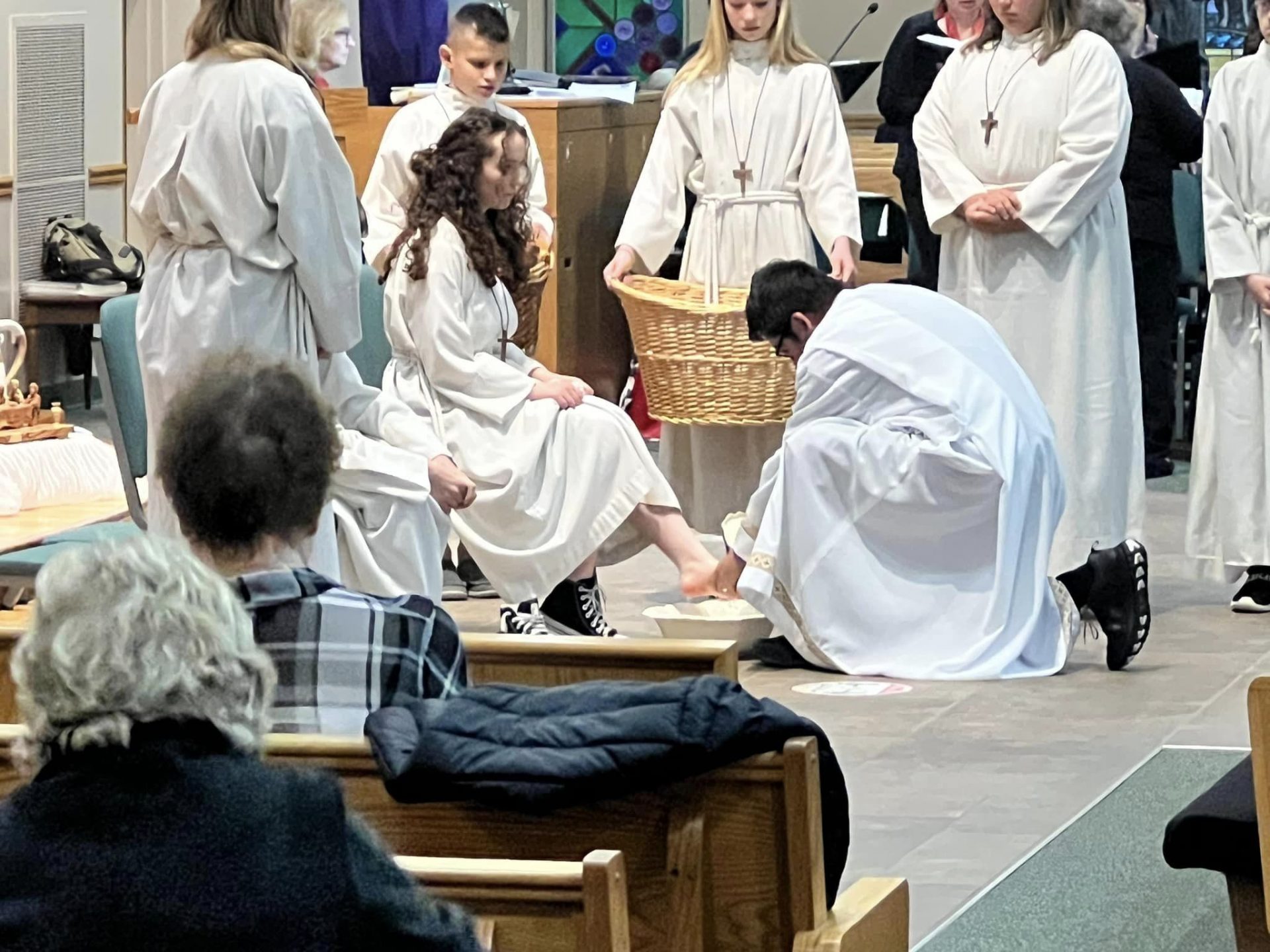
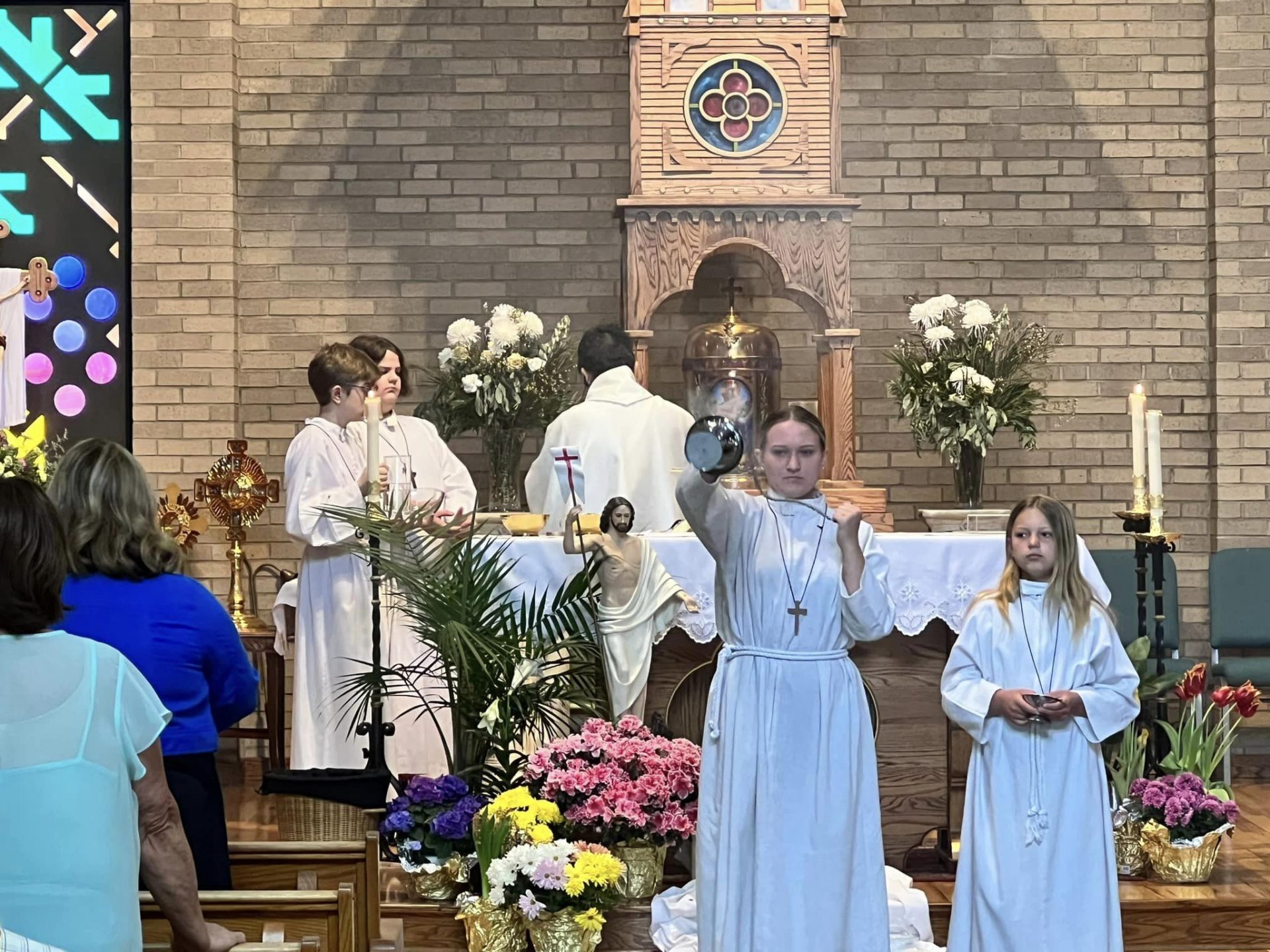
Adult Altar Server
Adult Altar Server assist the priest at Mass. We need adult servers to serve at daily Mass, and more specifically during funeral liturgies.
Are you an adult who is available during the morning hours? Do you attend daily Mass?
If you’ve said, “yes,” to either question, then please consider serving our parishes as an Adult Altar Server.
Lector
This ministry comes from thecall to proclaim the Word of God in liturgical assembly. Lectors are men and women of the parish who are a part of them team that leads the congregation in worship.
They study and pray over the Scripture for Sunday and read the first and second readings from the ambo, in addition to leading the Prayers of the Faithful. The information below explains this ministry in more detail.
General Principles
Reading and Explaining the Word of God
When the Sacred Scriptures are read in the Church, God himself speaks to his people, and Christ, present in his word, proclaims the Gospel. Therefore, the readings from the Word of God are to be listened to reverently by everyone, for they are an element of the greatest importance in the Liturgy. Although in the readings from Sacred Scripture the Word of God is addressed to all people of whatever era and is understandable to them, a fuller understanding and a greater efficaciousness of the word is nevertheless fostered by a living commentary on the word, that is, by the Homily, as part of the liturgical action.(General Instruction of the Roman Missal [GIRM], no. 29)
Vocal Expression of the Different Texts
In texts that are to be pronounced in a loud and clear voice, whether by the Priest or the Deacon, or by a reader, or by everyone, the voice should correspond to the genre of the text itself, that is, depending upon whether it is a reading, a prayer, an explanatory comment, an acclamation, or a sung text; it should also be suited to the form of celebration and to the solemnity of the gathering. Consideration should also be given to the characteristics of different languages and of the culture of different peoples. (GIRM, no. 38)
Silence
The Liturgy of the Word is to be celebrated in such a way as to favor meditation, and so any kind of haste such as hinders recollection is clearly to be avoided. In the course of it, brief periods of silence are also appropriate, accommodated to the assembled congregation; by means of these, under the action of the Holy Spirit, the Word of God may be grasped by the heart and a response through prayer may be prepared. It may be appropriate to observe such periods of silence, for example, before the Liturgy of the Word itself begins, after the First and Second Reading, and lastly at the conclusion of the Homily. (GIRM, no. 56)
Scripture Readings
In the readings, the table of God’s Word is spread before the faithful, and the treasures of the Bible are opened to them. Hence, it is preferable that the arrangement of the biblical readings be maintained, for by them the unity of both Testaments and of salvation history is brought out. Nor is it lawful to replace the readings and Responsorial Psalm, which contain the Word of God, with other, non-biblical texts.
In the celebration of the Mass with the people, the readings are always read from the ambo.
The function of proclaiming the readings is by tradition not presidential but ministerial. Therefore the readings are to be read by a reader, but the Gospel by the Deacon or, in his absence, by another Priest. If, however, a Deacon or another Priest is not present, the Priest Celebrant himself should read the Gospel, and moreover, if no other suitable reader is present, the Priest Celebrant should also proclaim the other readings as well.
After each reading, whoever reads it pronounces the acclamation, and by means of the reply the assembled people give honor to the Word of God that they have received in faith and with gratitude. (GIRM, nos. 57-59)
The lector is instituted to proclaim the readings from Sacred Scripture, with the exception of the Gospel. He may also announce the intentions for the Universal Prayer and, in the absence of a psalmist, recite the Psalm between the readings.
In the celebration of the Eucharist, the lector has his own proper function (cf. nos. 194-198), which he himself must carry out. (GIRM, no. 99)
In the absence of an instituted lector, other lay people may be deputed to proclaim the readings from Sacred Scripture, people who are truly suited to carrying out this function and carefully prepared, so that by their hearing the readings from the sacred texts the faithful may conceive in their hearts a sweet and living affection for Sacred Scripture. (GIRM, no. 101)
The Liturgy of the Word
After the Collect, all sit. The Priest may, very briefly, introduce the faithful to the Liturgy of the Word. Then the reader goes to the ambo and, from the Lectionary already placed there before Mass, proclaims the First Reading, to which all listen. At the end, the reader pronounces the acclamation The word of the Lord, and all reply, Thanks be to God.
Then a few moments of silence may be observed, if appropriate, so that all may meditate on what they have heard.
Then the psalmist or the reader proclaims the verses of the Psalm and the people make the response as usual.
If there is to be a Second Reading before the Gospel, the reader proclaims it from the ambo. All listen and at the end reply to the acclamation, as noted above (no. 128). Then, if appropriate, a few moments of silence may be observed. (GIRM, nos. 128-130)
Functions of the Lector
The Introductory Rites
In the procession to the altar, in the absence of a Deacon, the reader, wearing approved attire [see GIRM, no. 339], may carry the Book of the Gospels, slightly elevated. In that case, the reader walks in front of the Priest but otherwise walks along with the other ministers.
Upon reaching the altar, the reader makes a profound bow with the others [see also GIRM, no. 274]. If he is carrying the Book of the Gospels, he approaches the altar and places the Book of the Gospels upon it. Then the reader takes his own place in the sanctuary with the other ministers. (GIRM, nos. 194-195)
The Liturgy of the Word
The reader reads from the ambo the readings that precede the Gospel. In the absence of a psalmist, the reader may also proclaim the Responsorial Psalm after the First Reading.
In the absence of a Deacon, the reader, after the introduction by the Priest, may announce the intentions of the Universal Prayer from the ambo.
If there is no singing at the Entrance or at Communion and the antiphons given in the Missal are not recited by the faithful, the reader may read them at an appropriate time (cf. nos. 48, 87). (GIRM, nos. 196-198)
The Concluding Rites
At the conclusion of the Mass, the lector does not process with the Book of the Gospels. The Lectionary is never carried in procession. The lector may join in the procession at the end of Mass in the same order as in the procession to the altar.
Extraordinary Minister of Holy Communion
EMOHC assist the priest in the distribution of Body and Blood of Christ during the Liturgy of the Eucharist. Ministers are commissioned after training. The information below describes this ministry in more detail.
In every celebration of the Eucharist, there should be a sufficient number of ministers of Holy Communion so that it may be distributed in a reverent and orderly manner. Bishops, priests and deacons distribute Holy Communion in virtue of their office as ordinary ministers of the Body and Blood of the Lord. (1) When the size of the congregation or the incapacity of the bishop, priest, or deacon requires it, the celebrant may be assisted by other bishops, priests, or deacons. If such ordinary ministers of Holy Communion are not present, “the priest may call upon extraordinary ministers to assist him, i.e., duly instituted acolytes or even other faithful who have been deputed for this purpose. In case of necessity, the priest may also depute suitable faithful for this single occasion (GIRM 162).”
Extraordinary Ministers of Holy Communion should receive sufficient spiritual, theological, and practical preparation to fulfill their role with knowledge and reverence. In all matters they should follow the guidance of the diocesan bishop ( Norms for the Distribution and Reception of Holy Communion Under Both Kinds for the Dioceses of the United States of America, NDRHC, no. 28). When recourse is had to Extraordinary Minister of Holy Communion, especially in the distribution of Holy Communion under both kinds, their number should not be increased beyond what is required for the orderly and reverent distribution of the Body and Blood of the Lord. In all matters such Extraordinary Ministers of Holy Communion should follow the guidance of the diocesan bishop (IBID).
All ministers of Holy Communion should show the greatest reverence for the Most Holy Eucharist by their demeanor, their attire, and the manner in which they handle the consecrated bread or wine.
Minister to the Sick & Homebound
Ministers to the Sick & Homebound take communion to those unable to attend Mass due to physical and/or mental limitations. These ministers also are called upon to visit hospitals and nursing/personal care homes.
Ministers to the Sick & Homebound are also able to bring much needed pastoral care to those in need through prayer and compassion.
Ministers are commissioned after being trained and spending time under the direction of our Pastoral Minister and Pastor.
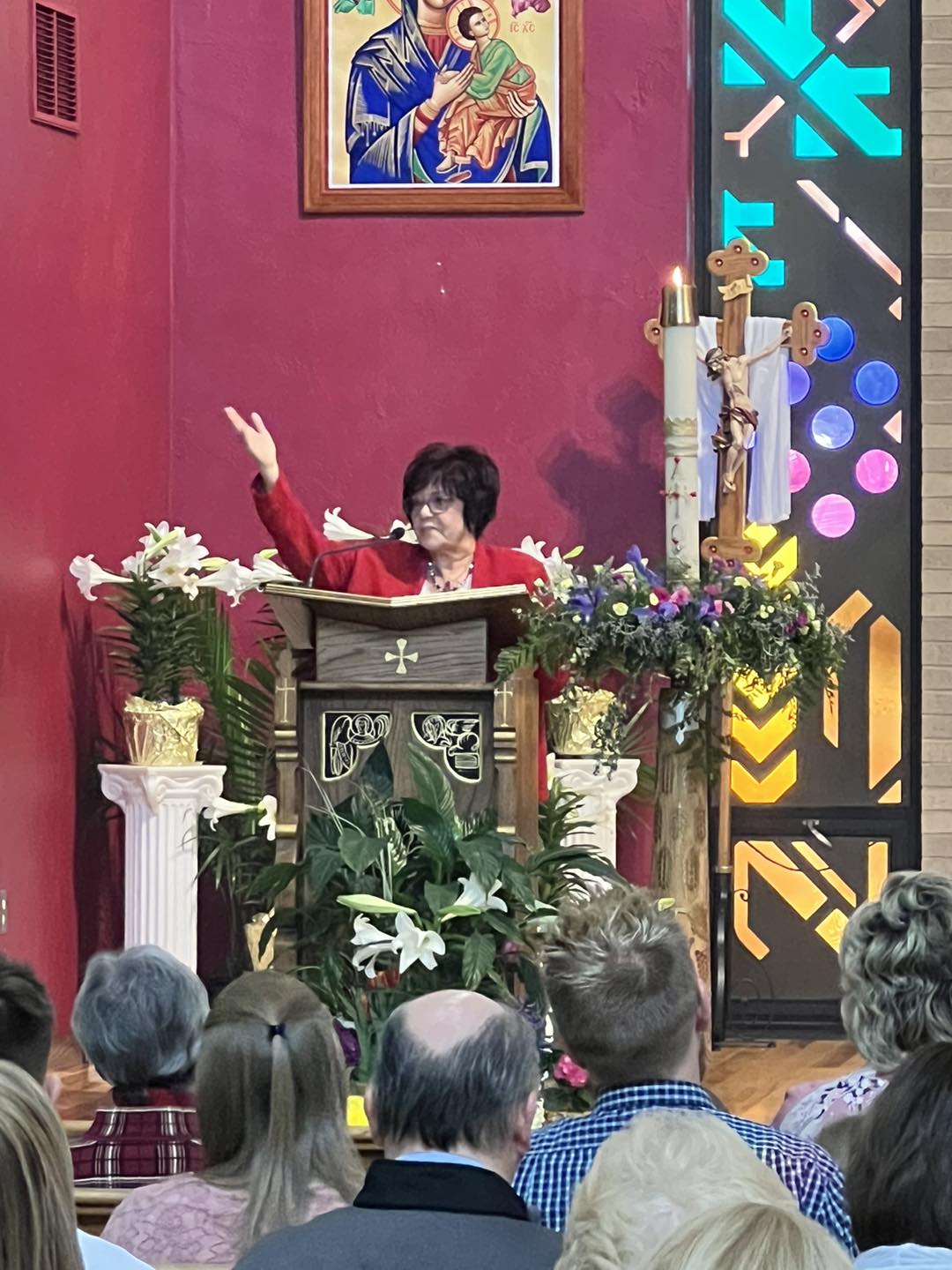

Music Ministry
Adult Choir
The parish choir is organized to provide accompanying music for the major liturgy of Sunday Masses, as well as special holy days throughout the year. The choir leads the congregation in praising God through liturgical music from September to early June. They practice once a week and whenever it is necessary before Christmas and Easter.
There is a number of specialized music pieces they prepare, which is meditative and offers inspiration for the congregation to join in. The choir is an invaluable instrument of our liturgy to enhance full and prayerful worship.
If you are interested in joining our choir, please contact Pat Filak, Director of Music Ministry.
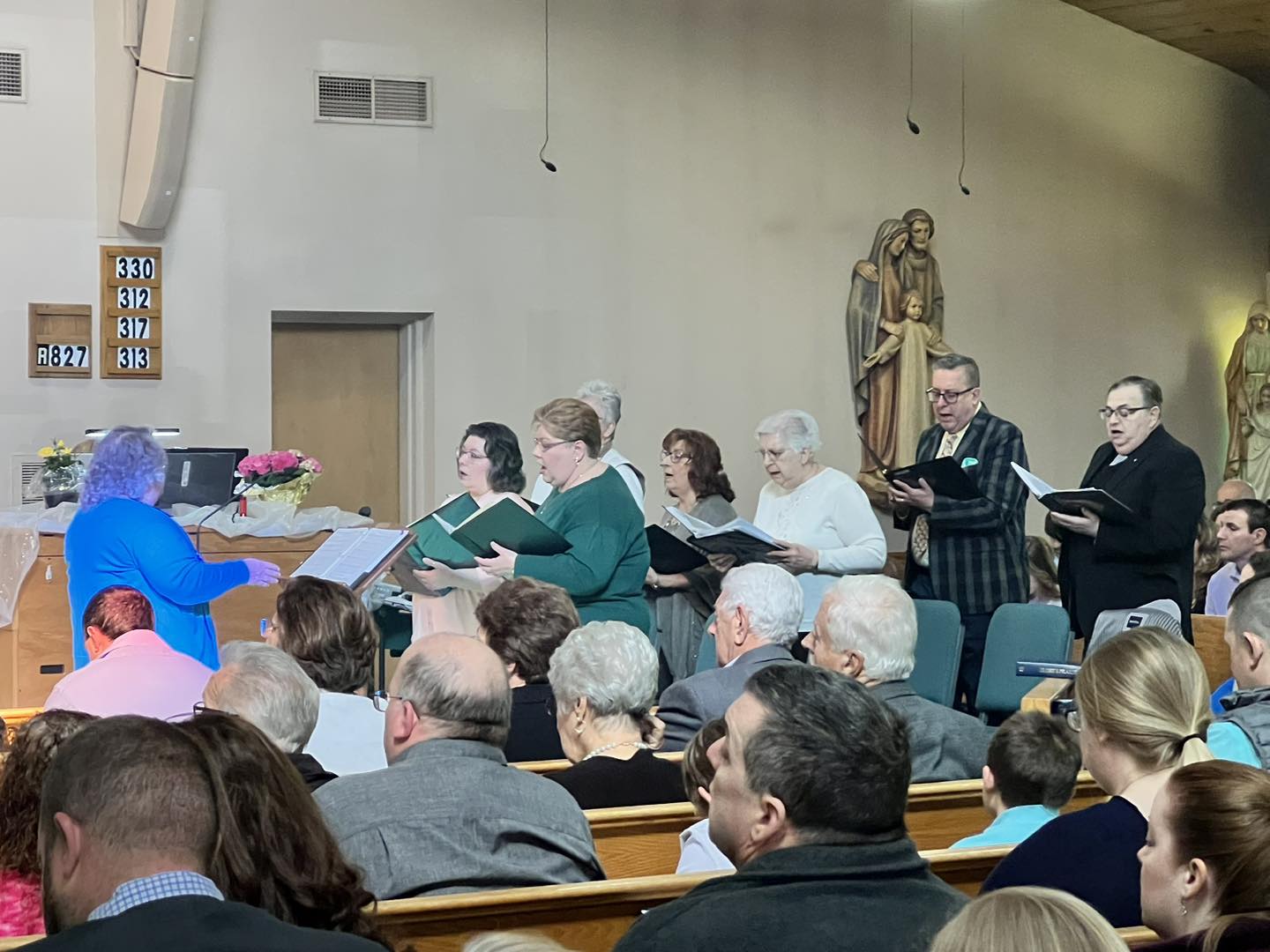
Cantor
This group works with our adult choir. Members are trained and assigned to lead the singing at all of our Masses. If you are interested in becoming a cantor, please contact Jenn Loomis, Coordinator of Music Ministry.
Youth Music Ministry, Choir and Cantors
Our Youth Music Ministry leads our monthly Youth Mass through playing instruments and singing. Youth Masses are held on the 3rd Sunday of each month at the 9:30am Mass. They also lead at the Christmas Eve Vigil and First Communion Masses. Youth in Grades 1 through 12 are encouraged to join us. Our Youth Music Ministry is led by Jenn Loomis. She meets with the members for practice as scheduled and will practice with musicians separately also.
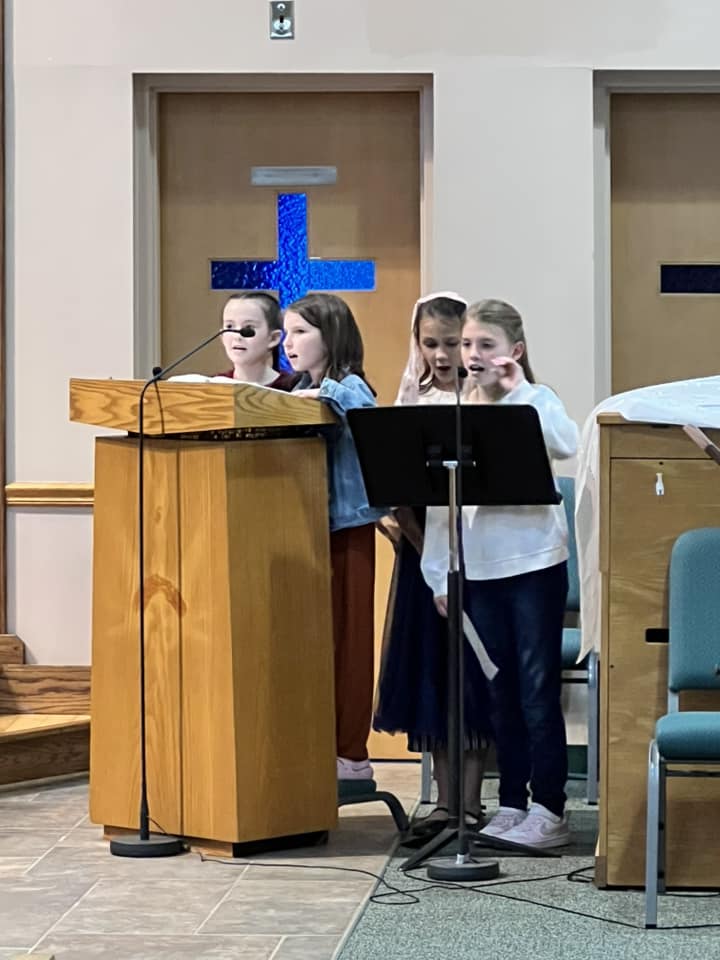

Memorial Choir
The memorial choir is composed of parishioners who love to sing and are available when a funeral is scheduled. This is seldom harmonized. Everyone sings the melody part in unison and seldom do they gather for rehearsals. Cathy Shandor is the regular organist for the funeral choir. The choir provides a service to families grieving the loss of a loved one.

Usher
Ushers are a group of dedicated men of the parish communities who perform specific duties at Mass. Ushers are formed into three teams to be available at Mass early enough on weekends to act as cordial greeters to those coming to worship.
Ushers help with the smooth operation of some of the mechanics of the liturgy, for instance, ensuring proper seating of the congregation; taking up the collection; distributing bulletins; and any other item that is needed for any given liturgy. Ushers also help to straighten and tidy up after Mass is over.
Greeter
Greeters are the first smiling face you see when entering the church. Men, Women, Families…..all are welcome to join in the, well, welcoming!